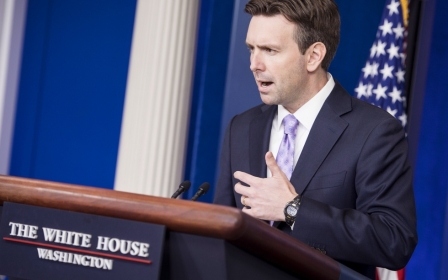Iraqis return to Fallujah as Abadi vows not to shell civilian areas

Hundreds of Iraqi civilians who had fled Fallujah fearing airstrikes by Iraqi forces have now returned to the area, according to a local official who spoke to Anadolu Agency.
The news comes a day after Prime Minister Haidar al-Abadi said on Saturday that he had ordered a halt to the bombardment of populated areas.
In a statement, Abadi, who got support for his new cabinet on 8 September, said he had “ordered the Iraqi Air Force to halt (the) shelling of civilian areas, even in those towns controlled by ISIS," using one of the Islamic State (IS) group's old acronyms.
"But the government will not relent in its efforts to hunt down ISIS members wherever they are," he added.
His predecessor Nuri al-Maliki had been criticised for authorising air raids on densely-populated areas as part of operations to oust IS from regions it had conquered.
Abadi was selected as prime minister-designate on 11 August – after a brief power struggle, Maliki was appointed one of three deputy Presidents in Abadi’s new cabinet.
In late July, Human Rights Watch warned that government air strikes were "wreaking an awful toll on ordinary residents.”
It had also urged the government to stop resorting to "barrel bombs" - crude devices stuffed with fertiliser, shrapnel or any improvised explosive mix - that are much cheaper than conventional weapons but also far less accurate.
The United Nations' top envoy in Iraq, Nickolay Mladenov, welcomed Abadi’s announcement on Saturday.
"Iraq is facing a humanitarian catastrophe of immense proportion, with exponentially rising numbers of displaced people, that should be settled in accordance with the citizens' human rights," he said.
One of Iraq's main Sunni parties, Mutahidoon, also welcomed Abadi's move, arguing that it would help turn residents in Sunni areas against the Islamic State.
"The prime minister issued his decision to halt shelling civilian areas and this will definitely help isolate terrorist groups and lead them to be targeted by the people of the area itself," a statement said.
In a further sign that Abadi is seeking to distance himself from the era of Maliki rule, parliamentarians told Iraqi news site Sot al-Iraq on Thursday that Abadi was reviewing many of the decisions taken by his predecessor during the last weeks of the Maliki government.
According to the site's sources, Abadi will be reviewing recent decisions that saw Maliki appoint individuals close to him politically as the heads of nominally independent institutions.
Stay informed with MEE's newsletters
Sign up to get the latest alerts, insights and analysis, starting with Turkey Unpacked
Middle East Eye delivers independent and unrivalled coverage and analysis of the Middle East, North Africa and beyond. To learn more about republishing this content and the associated fees, please fill out this form. More about MEE can be found here.




